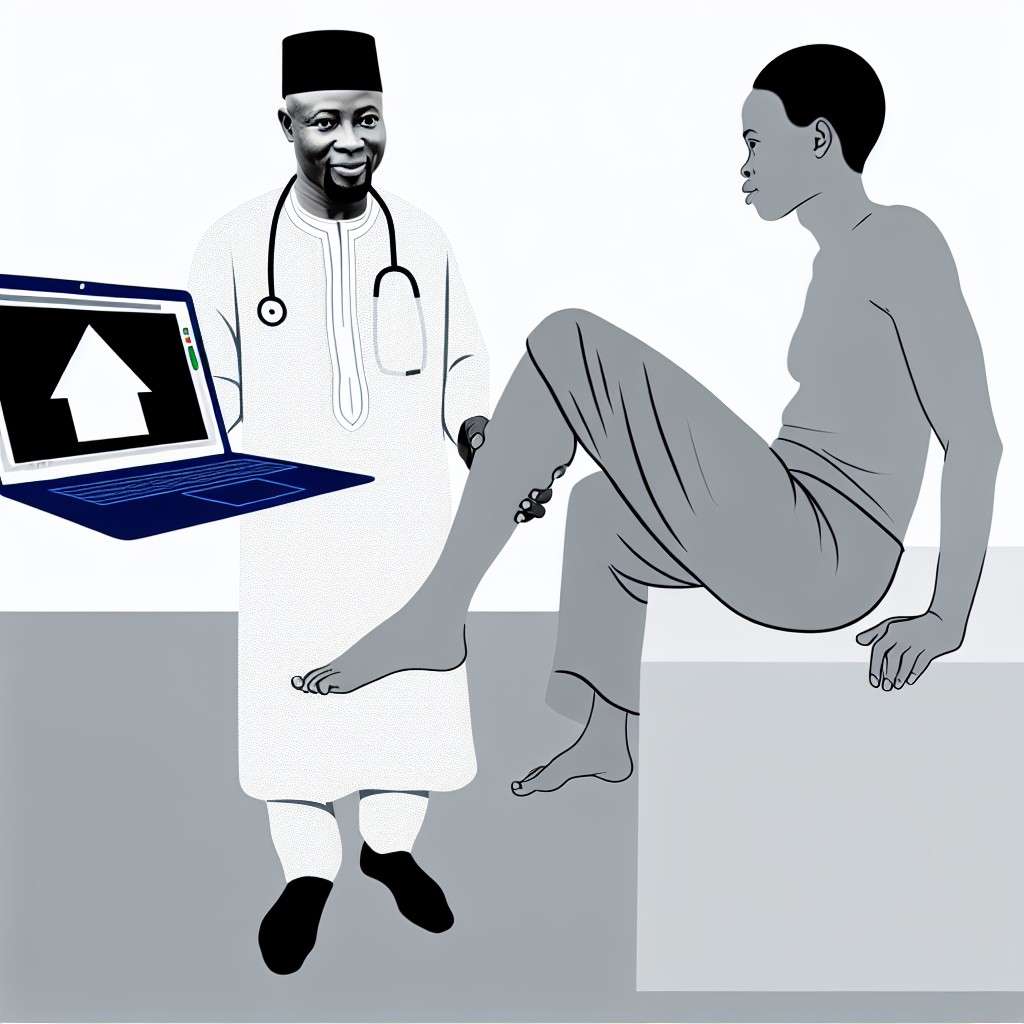Physiotherapy in Nigeria is a growing field.
It plays a crucial role in healthcare.
The focus on holistic health approaches is increasing.
Physiotherapists are becoming indispensable in the Nigerian healthcare system.
Brief Overview of Physiotherapy in Nigeria
Physiotherapy in Nigeria involves the treatment of various physical ailments.
It also treats injuries and disabilities through targeted exercises, manual therapy, and education.
The main goal is to improve mobility, function, and quality of life for patients.
Importance of Physiotherapists in Healthcare
Physiotherapists are essential members of healthcare teams.
They help rehabilitate patients, manage pain, and prevent injuries.
Physiotherapists work in hospitals, rehabilitation centers, and sports facilities.
They also provide care in home care settings.
Furthermore, physiotherapists play a significant role in promoting public health.
They educate individuals on preventive measures and healthy living practices.
In addition, they teach injury prevention strategies.
Physiotherapists empower patients to take control of their health and well-being.
They collaborate with other healthcare professionals to create comprehensive treatment plans.
Each plan is tailored to meet the patient’s unique needs.
The physiotherapist’s expertise in movement and function is invaluable.
They address a wide range of conditions, from musculoskeletal disorders to neurological issues.
Physiotherapists in Nigeria enhance the overall healthcare system.
They provide specialized care and promote wellness.
Ultimately, they improve the quality of life for patients.
Their unique skills and dedication make them indispensable partners in achieving optimal health outcomes.
History of Physiotherapy in Nigeria
Physiotherapy is also known as physical therapy.
It has a long history in Nigeria.
The profession first emerged in the country in the early 20th century.
Establishment of Physiotherapy as a Profession in Nigeria
- In the 1950s, physiotherapy was officially recognized as a profession in Nigeria.
- The first physiotherapy school was established in Lagos in 1965.
- Training programs were developed to educate Nigerians on physiotherapy principles and practices.
Evolution and Growth of Physiotherapy Practice in the Country
- Over the years, the field of physiotherapy has evolved and expanded in Nigeria.
- Physiotherapists play a crucial role in the healthcare system by providing rehabilitation services.
- The number of physiotherapy clinics and hospitals has significantly increased across the country.
- Physiotherapists are now essential members of multidisciplinary healthcare teams.
The history of physiotherapy in Nigeria shows the profession’s growth and development.
Physiotherapists continue to provide quality care and rehabilitation services to patients.
Physiotherapists play a crucial role in rehabilitation.
They work with patients to restore movement and function.
Working with Patients in Rehabilitation
Physiotherapists utilize various techniques such as exercises.
They use manual therapy and equipment to help patients regain mobility.
They create personalized treatment plans based on the individual’s condition.
They consider patient goals for recovery when making plans.
Support for Recovery from Injuries and Surgeries
Physiotherapists assist patients recovering from sports injuries.
They also support recovery from workplace accidents and surgeries.
The focus lies on improving strength and flexibility.
They enhance overall physical well-being through targeted interventions.
Guiding patients through exercises facilitates a safe recovery process.
Collaboration with Healthcare Professionals
Physiotherapists work closely with doctors and nurses.
Transform Your Career with Expert Guidance
Get personalized mentorship consulting that’s tailored to your unique path. Our expert advice is actionable and exclusive.
Get StartedThey collaborate with other specialists to coordinate comprehensive care plans.
They provide valuable input during team meetings.
This collaboration ensures a holistic approach to rehabilitation.
Sharing their expertise improves health outcomes and quality of life.
Educating Patients on Self-Management
Physiotherapists empower patients through education on self-management techniques.
They teach proper body mechanics and posture.
Exercises are provided to help patients maintain function.
They focus on preventing future injuries through education.
Promoting Patient Wellness and Lifestyle Changes
Physiotherapists advocate for patient wellness by promoting active lifestyles.
They emphasize proper ergonomics and healthy habits.
Support is given to patients for making positive lifestyle changes.
This enhances both physical and mental well-being.
Through education and guidance, patients gain control over their health.
Advances in Rehabilitation through Research and Innovation
Physiotherapists engage in research to improve rehabilitation practices.
They explore new treatment modalities and approaches.
Staying updated with developments ensures evidence-based care.
Innovation and continuous learning enhance rehabilitation quality and efficacy.
Community Outreach and Advocacy for Rehabilitation Services
Physiotherapists actively engage with communities to raise rehabilitation awareness.
They advocate for policies supporting access to rehabilitation for all individuals.
Outreach programs and partnerships address healthcare disparities.
They promote inclusivity in healthcare delivery.
Physiotherapists support patients in regaining mobility and improving quality of life.
Their expertise and dedication positively impact many individuals’ lives.
See Related Content: Preparing Children for ENT Surgery in Nigeria
Physiotherapists in Nigeria play a crucial role in the healthcare system.
They collaborate with other healthcare professionals to provide comprehensive care to patients.
Interdisciplinary Approach to Patient Care
One key aspect of physiotherapists’ role in Nigerian healthcare is their interdisciplinary approach to patient care.
Physiotherapists work closely with doctors, nurses, and allied healthcare professionals to develop personalized treatment plans.
Collaboration with Doctors, Nurses, and Allied Health Professionals
Physiotherapists collaborate with doctors to diagnose patients’ conditions effectively.
They develop treatment plans based on medical history and physical assessments.
Physiotherapists work with nurses to monitor patients’ progress continuously.
They adjust treatment plans accordingly to ensure the best outcomes.
Additionally, physiotherapists coordinate care with other allied health professionals.
This includes occupational therapists and speech therapists.
Such teamwork provides holistic care for patients with complex needs.
- Collaborating with doctors to diagnose patients’ conditions
- Developing personalized treatment plans based on medical history and assessments
- Working with nurses to monitor patients’ progress and adjust treatment plans
- Coordinating care with other allied health professionals for patients with complex needs
Physiotherapists in Nigeria play a vital role in the healthcare system.
They collaborate with healthcare professionals to provide comprehensive care to patients.
Their interdisciplinary approach ensures patients receive the best treatment possible.
This approach leads to improved health outcomes for patients.
Uncover the Details: How to Apply for Radiography Programs in Nigeria
Physiotherapists play a crucial role in addressing public health challenges in Nigeria.
Promoting Physical Activity and Healthy Lifestyle
- Physiotherapists educate individuals on the importance of physical activity.
- They create personalized exercise plans to help people stay active.
- Physiotherapists promote healthy lifestyle choices to prevent diseases.
- They work with patients to improve their overall well-being through physical activity.
Preventing and Managing Chronic Conditions through Physical Therapy
- Physiotherapists help in preventing chronic conditions through early intervention.
- They provide rehabilitation services to manage chronic conditions like arthritis.
- Physiotherapists offer pain management techniques for individuals with chronic illnesses.
- They improve mobility and functionality in patients with chronic conditions.
Physiotherapists are essential in promoting public health in Nigeria.
They improve the quality of life for many individuals.
You Might Also Like: Public Health Awareness Campaigns in Nigeria

Challenges Faced by Physiotherapists in Nigeria
- Lack of resources and infrastructure
- Limited access to quality education and training
Physiotherapists in Nigeria face numerous challenges in providing quality healthcare services.
These challenges arise due to various factors in the healthcare environment.
One major challenge is the lack of resources and infrastructure to carry out their duties effectively.
Many physiotherapy clinics and hospitals in Nigeria lack basic equipment and facilities.
These are essential for the proper treatment of patients.
The shortage of resources hinders physiotherapists from delivering the best possible care.
This ultimately impacts the quality of healthcare in the country.
Moreover, limited access to quality education and training is another significant challenge.
Physiotherapists in Nigeria struggle due to the lack of adequate educational programs and training.
This makes it difficult for healthcare professionals to enhance their skills effectively.
They also find it challenging to stay updated with the latest advancements in the field.
Lack of Resources and Infrastructure
The inadequate availability of equipment like ultrasound machines affects physiotherapy services.
Equipment such as electrical stimulation devices and exercise tools are also scarce.
This scarcity makes it difficult to provide comprehensive care to patients.
The lack of resources also affects the effectiveness of treatment programs.
Rehabilitation outcomes for patients often become suboptimal due to this issue.
Furthermore, many healthcare facilities in Nigeria have poor infrastructure.
Proper treatment rooms and facilities are often unavailable for therapy sessions.
This situation makes it hard to create a conducive environment for patients undergoing therapy.
As a result, the overall quality of care can be significantly impacted.
Limited Access to Quality Education and Training
Access to quality education programs is a major obstacle for aspiring physiotherapists.
Many struggle to find accredited institutions offering up-to-date and comprehensive curricula.
This hinders their ability to acquire necessary knowledge and skills to excel professionally.
Additionally, continuous professional development opportunities are scarce.
Practicing physiotherapists find it challenging to stay abreast of new techniques.
Such limitations negatively affect their ability to deliver high-quality care to patients.
Lack of training opportunities also hampers professional growth within the healthcare sector.
Addressing Challenges to Improve Physiotherapy Care in Nigeria
Physiotherapists in Nigeria face significant challenges related to resources and education.
Addressing these obstacles is crucial to enhance healthcare services offered.
Improving infrastructure and providing adequate equipment will support better patient care.
Expanding access to quality education and training is vital for professional development.
These actions will contribute greatly to the advancement of physiotherapy in the country.
Explore Further: Challenges Facing Medical Rehabilitation in Nigeria
Significance of Physiotherapists in Nigerian Healthcare
Recap of the importance of physiotherapists in Nigerian healthcare:
Physiotherapists play a crucial role in improving the health and well-being of individuals in Nigeria.
They provide expert care and rehabilitation services for many conditions.
These conditions include musculoskeletal disorders, neurological conditions, and sports injuries.
Their expertise helps patients regain mobility and reduce pain.
Moreover, they improve the overall quality of life for patients.
Supporting and advancing physiotherapy practice in Nigeria:
It is essential to recognize and support physiotherapists’ work in Nigeria.
This requires providing necessary resources and infrastructure for their practice.
Professional development opportunities are also vital for their growth.
Collaboration among healthcare professionals, policymakers, and the community must be strengthened.
Such cooperation ensures physiotherapists continue impacting the healthcare system significantly.
By advocating for improved physiotherapy services, health outcomes can be enhanced nationwide.
Additional Resources
Bullying in the healthcare workplace: a cross-sectional study among …




